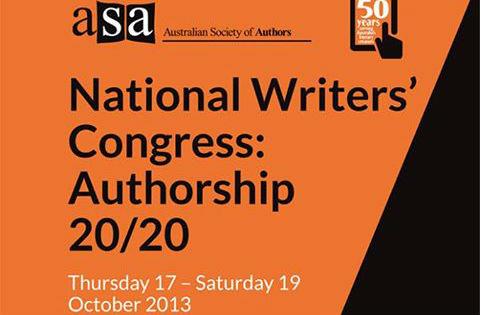From photocopying to digital piracy, new technology has always threatened writers’ incomes.
‘In this age of unrestricted copying, the protection of any artist’s work is a matter that should concern everybody.’ – ASA Executive Secretary, Deidre Hill
In 2013, the threat of online piracy feels like an insoluble problem for most authors. But it’s a grounding thought to realise the above quote is actually from 1973 when authors’ copyright was threatened by a now familiar technology – the photocopy machine. Back in the late ‘60s and early ‘70s, this new technology allowed copyright to be violated hundreds of times a day, when schools and libraries introduced copying services for their students and teachers. But in 1974 the Australian Society of Authors established Copyright Agency Limited (now Copyright Agency), a non-profit organisation that in 2012 collected $140 million of fees from these same schools and libraries and put them in the pockets of authors and publishers to compensate for the copying of their work.
The Copyright Agency was a landmark achievement of the ASA, which at that time had been in existence for just eleven years. Over those eleven years the landscape for Australian authors had already changed dramatically. Consider that in 1963 a local author could be paid a 10% royalty for sales made in the UK but only a 5% royalty when their book, considered an ‘export sale’, was purchased in their own country.
Returning from England to his home country, author Dal Stivens described the conditions of Australian authors at that time as ‘feudal’. Bad contracts were standard, fees for publication and broadcasts were low, and rights harvesting (whereby a newspaper would purchase copyright for contributed articles at a modest fee, then syndicate the work around the world for big profits) rife.
There was a desperate need for an organisation to protect and promote authors’ interests and so, in 1963, together with Walter Stone and founding secretary, Jill Hellyer, the first meeting of the ‘Proposed Writers’ Association’ met at Federation House in Sydney with 100 or so writers in attendance. Not everyone was in favour of the formation. ‘Frank Hardy got up and tried to destroy it [the meeting] on the spot,’ Jill Hellyer remembered afterwards. ‘He had been sent by Judah Waten from the very strong Melbourne branch of the Fellowship [of Australian Writers] because they thought we were a threat.’
Despite the controversy, the Australian Society of Authors was established with Dal Stivens as founding president who, together with other activists, immediately swung into action. By 1964 the Colonial royalty had been abolished from British contracts and a Minimum Approved Book Contract published by 1967 after extensive dialogue between authors and publishers.
However, it wasn’t until 1975 that another of the ASA’s landmark achievements came to fruition. To the public, it’s a little known or considered fact that authors receive recompense for copies of their books that are held in libraries. But before 1975 authors received no compensation for books purchased by libraries and loaned out for free to the public. The campaign for a Public Lending Right program was led by author and journalist, Colin Simpson. ‘[I got] sick of getting nowhere with the Libs by letter writing,’ he commented on the campaign later. ‘I began to go after Whitlam – personally. I used to turn up at functions … and it got so that, knowing what I wanted to talk about, he’d hail me with, ‘Colin! Public Lending Rights, eh!’’
PLR is now an Australian Government program, making payments to eligible Australian creators and publishers in recognition of income lost through the free multiple use of their books in public and educational lending libraries. Many authors now rely on these payments for their income, and they were not to be given up lightly, as the Howard government learned in 1997 when they proposed funding cuts to the scheme. The ASA bused authors in to Canberra to protest, and the event was widely covered in the media, while some libraries threatened to withdraw the affected books from their shelves. Shortly afterwards the proposed change to PLR was quietly dropped.
As times change, the ASA must change with them and work not to halt progress but to allow authors to make the most of new technologies and seek remuneration for authors’ work wherever it is made available. As the ASA enters its fiftieth year we look towards combatting new threats to copyright, achieving fairer eBook royalties, establishing a scheme for digital lending rights and many other challenges of the digital age.
Among the problems the ASA is most conscious of is the unseemly grab for intellectual property for digitisation purposes that is currently occurring both in Australia and overseas. This commonly takes the form of offers to authors to digitise their old or backlist works at special deal rates, but without any particular marketing or attention-getting activity, which is essential to achieving decent sales. As physical book holdings in libraries decline in favour of electronic files located on servers and libraries increasingly involve themselves in wholesale digitisation exercises, the agreement of many of the people who actually wrote the books or hold licenses to them is more important than ever.
This year, the ASA has launched two wide-reaching schemes to place greater control of digitisation into authors’ hands (and money into authors’ pockets). The DigiJournals Scheme is a licensing program for authors managed on behalf of the ASA by Copyright Agency. It covers the online sale of digitised works such as short stories and poems via certain electronic databases and journals. Complementing this is Authors Unlimited, a new eBook conversion and sales portal at www.authors-unlimited.org. Authors Unlimited allows authors with backlist works to take control of their digitisation, offering reasonable rates for eBook conversion, author control of RRP, plus an 80% royalty for sales made through the site.
These two schemes represent a significant step supporting the future of authorship by the ASA and the latest in a broad-ranging program of services that have continued to grow since the ASA began offering contract assessments in the early 1960s. As the role and landscape of authorship shifts in 2013 the ASA has introduced a Contract Negotiation Advisory Service and US Tax Advice service (for authors earning income on sales through US e-tailers such as Amazon). And in 2012 the ASA expanded its professional development program of seminars for authors now dealing with self-publishing, eBooks, marketing and publicity, all areas that are becoming increasingly the province of the author in a changing industry.
In addition to new and existing services for authors, the ASA will continue to speak out to industry and government on the issues authors will face in the coming years. Copyright – the single most important right authors have, being the right to control their own creations – is threatened by the idea that whatever appears on the internet, or that can be downloaded from there, should be free. Digital piracy is a growing problem for authors as well as publishers. Not yet as bad as for film or music, it is nevertheless now very visible, with authors reporting their books to be available on numerous pirate sites. Digital piracy needs to be more systematically countered. The ASA argues that all forms of prevention and sanctions should be applied – ISPs have to accept greater responsibility, an Australian-based ‘notice and takedown’ scheme for infringing websites may need to be established, and so on.
Many new title eBooks are still being sold on unsatisfactory terms, with ‘net receipts’ to authors being very variable in actual dollar amounts received (a separate matter from sales achieved). The ASA will continue to argue for at least 35% of net receipts (‘net receipts’ being the most common formula for paying authors at present) as opposed to the more common 20-25%. We also seek a ‘commitment to publish’ clause for eBooks, a format too often swept up as a nice-to-have by publishers but not necessarily exploited.
PLR/ELR was established as a means of compensating authors for the loss of sales of their books due to free library access. This has been a valuable income supplement to authors, amounting to about $20 million each year. However, current PLR/ELR rules make no provision for eBook ‘lending’. Copies of print books in libraries will inevitably reduce over time, leading to less money being available through this very important author-income support scheme. More and more eBook versions of Australian authors’ books will be ‘accessed’ by readers (‘borrowing’, implying a physical object, is not the right word for what happens with a digital file) as we move into a digital future.
At this critical moment in the history of authorship, the Australian Society of Authors will host a series of events to both celebrate the achievements of the past fifty years and address the concerns of the future. The ASA will bring together those who write, and those who deliver writing to readers and markets in a National Writers’ Congress: ‘Authorship 20/20’. The focus of this industry event will be to clarify the issues and impediments to the further development of author practice; to positively influence the wider writing sector, including government and cultural agencies, by providing author‐supportive ideas for the future; to present participants with additional tools to understand and navigate their individual activity; to celebrate the achievements of the literary sector, and lay the groundwork for any future such congresses. In this way, writers will be much better placed to see and navigate the challenging questions of authorship and to manage the decisions and directions they take – by 2020, with 20/20.
The event is to be a writers’ congress rather than a writers’ festival, a forum in which to consider and address author practice. No such broad-based congress of Australian authors, illustrators and literary professionals has ever been held before. Authorship 20/20 will take place at the National Maritime Museum in Sydney from Thursday 17 – Saturday 19 October, 2013. Approximately 200+ industry members are expected to attend.
Meanwhile, the previous half-century of ‘The Union of the Imagination’ (as David Marr once described the ASA) will be celebrated in August 2013 at the ASA’s 50th Anniversary Celebration Dinner. Taking place in Melbourne on Tuesday 27 August, the dinner’s keynote address will be delivered by Don Watson, admired Australian speechwriter, speaker and award-winning author. Followed by an evening of fine food, good wine, great company and festive entertainment, the anniversary dinner will be an opportunity to meet, drink and dine with some of the people who have contributed to the ASA’s legacy, and together celebrate the achievements of fifty years. Tickets to both the Anniversary Dinner and the National Congress are available for purchase at the ASA’s website www.asauthors.org.
Finally, the struggles and achievements of the ASA will be celebrated in the forthcoming title from Keesing Press Status and Sugar: A History of the Australian Society of Authors 1963-2013 by Stephany Steggall. The book will explore the historical, cultural and political environments which both led to the creation of the ASA and shaped many of its activities over the past fifty years. And behind them is the driving force of the ASA: its councillors, members and staff. Steggall will portray the personalities who’ve advanced the ASA’s causes: Dal Stivens, Barbara Jefferis, Frank Moorhouse, Thomas Keneally, Rob Pullan and so many others. ASA members have frequently differed in opinion, and battles have rarely been won with ease. In capturing these challenges and controversies, Stephany points to one universal quality evident throughout the organisation’s history: the people involved are passionate about Australia’s literary creators and will work tirelessly to support them. It is this passion that will continue to propel the ASA forward in the decades to come.





